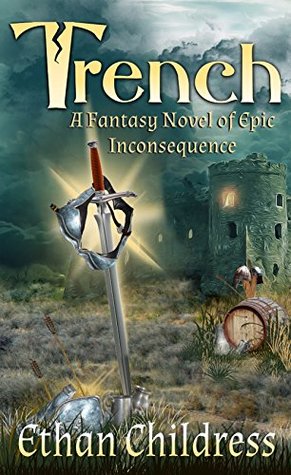|
Trench: A Fantasy Novel of Epic Inconsequence by Ethan Childress is a series of vignettes about a group of soldiers trying to get by in the fringes of the Thoussand Years War. The origins of the war are hilariously explored in the prologue--basically, humans, dwarves, and elves teamed up against the trolls, goblins, and orcs and please let’s not dwell on who ate who first. The war has been going on for a thousand years and shows no signs of ever ending, which leaves our band of soldiers living in the trenches well outside any sort of civilization. They have no hope of ever going home, so they just try to take care of each other and make it until the next regularly-scheduled sneak attack. One day they’re trying to sneak a hungover goblin across The Grinder (think No Man’s Land) without breaking a holiday ceasefire. One day they’re trying to impress dignitaries from an inbred, stupid, bigoted and more importantly wealthy and generous family in order to keep the shipments of mutton coming. Of course, it’s still a war story so expect some loss and tragedy along the way. It’s basically M*A*S*H set in a fantasy-themed World War One.
Childress has a lot of fun with the setting and black humor flows out of it. Miller and his best friend Doug Treesinger gamble over which new recruit will foolishly get himself killed first. Fairies on the front turn feral because they’ve been trapped in a place bereft of beauty. Animals evolved to survive life on the trenches, such as crows who evolved to become evil and try to goad soldiers into the Grinder for a feast. Even the sentient races are affected. It was no great secret that the first people to rush onto the Grinder were going to die horribly, torn to pieces by the magical wards given dragon form. The real trick was deciding who would be the one to do it. Originally, it had been presented as a brave and noble sacrifice, a great honor of personal sacrifice given to only the most selfless and noble of soldiers. But, after the centuries of brave, noble, selfless soldiers being ripped limb from limb for no real gain, the traits had, by in large, been selectively bred out of the common soldier. But the real draw is the characters and their friendships. This is an ensemble cast and most characters have their moment to shine, but the protagonist is Sergeant Jeremy Miller, who is smarmy, jaded, lazy, irreverent, and drunk if he can help it. He is in charge of integrating a band of new recruits including the spunky tinker Brenda Kettleblack, Moregrave the famous arch-mage who got bored with civilian life, and Caleb Witchslayer, whose name matches his job title, a hyper-zealous religious fanatic who has no shortage of trouble fitting in with a more relaxed, pragmatic army--for instance, the witches who run the healing tent. "These are the symbols of my religions," Witchslayer answered defensively. "Plural?" asked the elf. "Well, yes," the young man said. "Each has important messages to give to us about the world we live in." "Such as?" pressed Miller. "Well, this one," Witchslayer indicated a small bent line in a circle, "tells us that we are to kill witches with fire. And this one," holding up something that looked like a star crossed with a heart, "tells us how to find witches using salt and holy earth. And this one…" It’s the character relationships that really sell this book and a great deal of the humor comes from good-natured pranks and banter. For example, Miller is locked in a will they or won’t they flirtation with his commanding officer, who never misses an opportunity to hit on him with a double entendre. Good thing his best friend Doug Treesinger has implemented what he calls The Great Prank to cockblock him. First, the elf had explained his "Great Prank." Brenda had zoned in and out of the explanation favoring to watch the elf's delicate lips moving deftly with the words and allowing her mind to drift as to what else they would be good at. But she got the general drift. The elf told them that their captain, Bozeman, had been making advances to their sergeant, Miller, for the better part of a year, and that every time she did Treesinger talked Miller out of it by explaining away the advance as nothing more than military double-speak. This had bothered her a little, but it seemed to make the elf happy, so if Miller couldn't figure "The Great Prank" out, that was on him. All in all, this book hit a lot of the right notes for me: a serious setting taken to comical extremes, character banter, and a lot of heart. Unfortunately, there was one major negative: This book needed another round of proofreading. All too often I caught questionable punctuation and use of the wrong homonyms, such as “gate” instead of “gait.” I highlighted about a dozen myself and I wasn’t exactly on the hunt. They were a distraction and don’t stop this book from being excellent.
1 Comment
|
Review PolicyArchives
August 2018
Categories |


 RSS Feed
RSS Feed
